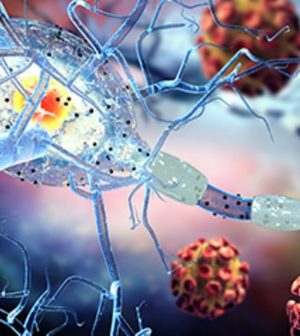- Could Your Grocery Store Meat Be Causing Recurring UTIs?
- Are You Making This Expensive Thermostat Error This Winter?
- Recognizing the Signs of Hypothyroidism
- 10 Strategies to Overcome Insomnia
- Could Artificial Sweeteners Be Aging the Brain Faster?
- Techniques for Soothing Your Nervous System
- Does the Water in Your House Smell Funny? Here’s Why
- Can a Daily Dose of Apple Cider Vinegar Actually Aid Weight Loss?
- 6 Health Beverages That Can Actually Spike Your Blood Sugar
- Treatment Options for Social Anxiety Disorder
COVID Vaccine Won’t Trigger MS Relapse: Study

Multiple sclerosis makes people vulnerable to more severe cases of COVID-19, but a new study finds that getting the COVID vaccine won’t trigger a relapse of MS symptoms.
“People with MS have an increased risk of severe COVID infection due to their level of motor disability or exposure to treatments that suppress their immune systems,” explained study lead author Dr. Xavier Moisset, of Clermont Auvergne University in Clermont-Ferrand, France.
“Some previous studies have found relapses following vaccination, leading some people to not seek the recommended booster doses,” he noted. “The good news is that our study found that there was no increased risk of relapse after COVID-19 vaccination for nearly all participants.”
The findings were published recently in the journal Neurology.
The research included 124,545 French people diagnosed with MS for an average of 14 years.
A majority (82%) had gotten at least one dose of a COVID vaccine, and of that group 95% went on to get a second dose while 59% got an extra booster dose.
Because any vaccine-linked relapse of MS typically occurs within 28 days of immunization, Moisset’s team tracked outcomes for all participants within 45 days of getting a COVID shot. Vaccines were made by Pfizer, Moderna, AstraZeneca or Janssen.
There was no link between getting the COVID vaccine or booster and the odds for severe relapse, the team reported. They factored out other issues that might help spur relapse, such as the time of year or certain treatments.
Comparing folks who did experience relapse against those who did not, the researchers again found no connection to COVID vaccination. In fact, under this analysis vaccination appeared linked to a slightly lower risk for MS relapse.
“Our findings are reassuring that these vaccines can be used without any worry about the risk of relapse,” Moisset said in a journal news release. “The absence of such a risk is encouraging for people with MS that they may receive booster shots when needed, especially if booster shots are to be repeated in the future.”
There was one exception: People with highly active MS who were untreated before they got a COVID shot did seem to have a small increased risk for relapse after receiving their third (booster) dose of vaccine, the study found. Those patients “should first receive disease-modifying treatment before their booster vaccination,” Moisset advised.
The study only looked at severe relapses that required corticosteroid treatment; it did not examine the risk of milder, “benign” relapse that does not need neurologist care.
More information
Find out more about multiple sclerosis relapse at the National MS Society.
SOURCE: Neurology, news release, Aug. 14, 2024
Source: HealthDay
Copyright © 2026 HealthDay. All rights reserved.










